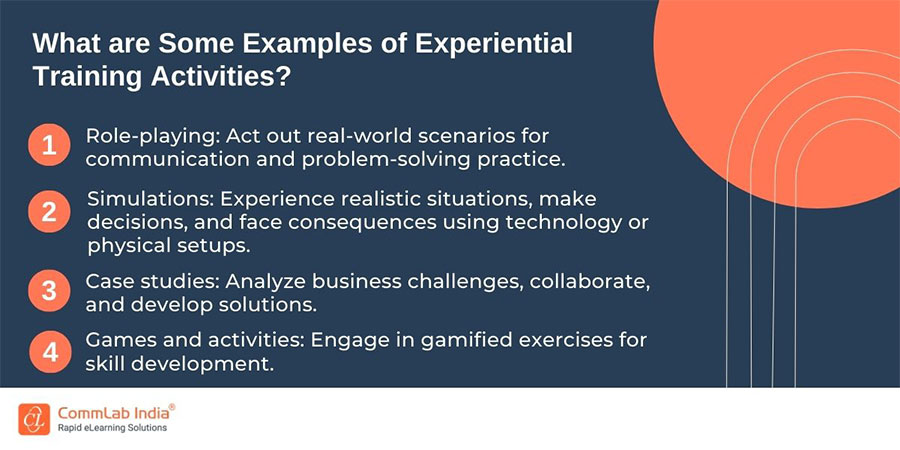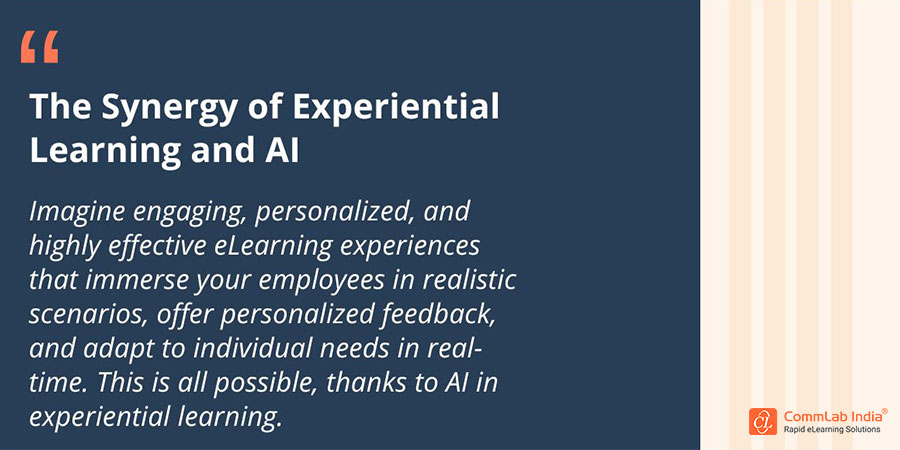How Can AI Elevate Experiential Learning for Corporate Success?

Today’s fast-paced and dynamic world demands fast and innovative ways to stay ahead, and this applies to the world of corporate training as well. The traditional corporate training model, characterized by long lectures and passive learning, is losing its effectiveness. It also interferes with their busy schedules and results in low completion rates. Considering this, it is important to have engaging, practical, and impactful learning experiences that equip modern employees with the skills and knowledge to excel in their roles. This is where experiential learning shines, and it shines brighter with AI.
What is Experiential Learning?
Experiential learning, with respect to corporate training, is a training approach that emphasizes active engagement and hands-on practice over passive knowledge transfer.
Benefits of Experiential Learning Include:
- Increased engagement and motivation
- Improved skill development
- Enhanced knowledge retention
- Boosted teamwork and collaboration
With experiential learning, the learners, instead of sitting through conventional lectures, can actively participate in immersive eLearning activities such as simulations, role-playing, case studies, etc. This approach allows them to apply new concepts and skills in a safe environment, fostering deeper understanding, skill development, and knowledge retention.
What are the Benefits of Experiential Learning in Corporate Training?
Increased engagement and motivation: Hands-on activities keep employees actively involved, boosting their engagement and sense of ownership in the learning process.
Improved skill development: As the activities in experiential learning involve the practical application of knowledge and skills, learners gain confidence and proficiency.
Enhanced knowledge retention: Experiential learning fosters deeper understanding compared to passive methods of corporate training, leading to better knowledge retention.
Boosted teamwork and collaboration: Experiential activities including role-playing learning simulations, etc involve collaboration, promoting communication, problem-solving, and teamwork skills.

Let us now discuss the role of artificial intelligent (AI) in experiential learning:
What is the Role of AI in Experiential Learning?
The synergy between experiential learning and AI technology holds immense potential for the present and future of corporate training.
Experiential learning, which is all about providing problem-solving skills and hands-on experiences, aligns seamlessly with AI's ability to process huge amounts of data and offer adaptive solutions. This intersection paves the path for more personalized and effective learning experiences.

What Are the Benefits of Combining Experiential Learning and AI?
1. Enhanced Personalization: AI algorithms analyze individual learning patterns, adapting content delivery to cater to the unique needs and preferences of each learner.
2. Adaptive Learning Paths: Dynamic learning paths adjust in real-time based on a learner's progress, ensuring optimal engagement and knowledge retention.
3. Real-time Feedback: AI provides instant feedback, allowing learners to refine their skills immediately, fostering a continuous improvement mindset.
4. Data-driven Insights: Analytics generated by AI offer valuable insights into learner performance, enabling educators to refine content and delivery methods.
→ Download eBook: Impact of Generative AI on L&D Teams
AI Tools for Experiential eLearning Design and Development
AI-powered tools are transforming the way we design and deliver experiential learning experiences in eLearning platforms. Here are some ways AI can accelerate eLearning design and development:
1. AI-powered Scenario Development
Imagine creating branching scenario simulations with minimal effort. This is possible with AI tools that can analyze your existing training materials and learning objectives to automatically generate realistic and engaging scenarios relevant to your learners' needs. This saves time and resources while ensuring your content resonates with your target audience.
2. Personalized Role-Playing with AI Avatars
Traditional role-playing simulations often require human actors, which can be expensive and time-consuming to arrange. AI introduces virtual avatars powered by machine learning. These avatars can respond dynamically to learners' choices and actions, creating a personalized and immersive role-playing experience.
3. Gamified Learning with AI-powered Feedback
Gamification, the use of game mechanics in non-game contexts, is a powerful way to boost engagement and motivation in eLearning. AI can analyze learner performance within game-based activities, providing personalized feedback and suggestions for improvement. This empowers learners to strategize, adapt, and master new skills through a fun and engaging process.
4. AR/VR Learning with AI-driven Interactions
Augmented Reality (AR) and Virtual Reality (VR) technologies can create highly immersive and realistic learning environments. AI can further enhance this experience by personalizing the learning journey within these environments. Imagine a virtual repair training scenario where AI reacts in real-time to the learner's actions and decisions, providing guidance and feedback for a truly hands-on learning experience.
Explore 5 Ways to Boost Your eLearning Outcomes with AR/VR [Watch Now]
5. AI-powered Content Creation and Curation
Developing high-quality content for experiential eLearning can be resource-intensive. AI tools can analyze existing training materials and learning objectives to automatically generate personalized learning modules, quizzes, and assessments. This frees up time and resources for instructional designers to focus on the overall learning experience strategy.
P.S.: Remember that these are just some examples of how AI can speed up and increase the impact of eLearning design and development. However, with the continuous evolution of AI technology, we can anticipate even more innovative tools and applications to emerge.
Wrapping Up
By incorporating AI tools into your eLearning design and development process, you can unlock the full potential of experiential learning. This powerful combination allows you to create engaging, personalized, and effective learning experiences that equip your employees with the skills and knowledge they need to succeed in the ever-evolving world of work.
Remember:
Experiential learning is an active, hands-on approach to learning that fosters deeper understanding and skill development. AI provides powerful tools to accelerate eLearning design and development, making experiential learning more accessible and effective. By leveraging AI, you can create personalized learning paths, develop interactive simulations, and provide personalized feedback to enhance the learning experience.
Embrace the power of AI in learning and transform your corporate training programs! Here's an eBook to guide you...



![5 Tips to Create Engaging and Effective eLearning Experiences [Infographic]](https://blog.commlabindia.com/hubfs/blogs/tips-create-engaging-effective-elearning-experiences-infographic.jpg)

